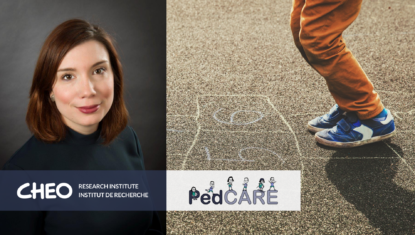26/01/2022
Ottawa, Ontario — Wednesday January 26, 2022

Resuming non-contact physical activity 72 hours after a concussion is safe, and may also reduce symptoms and the risk of delayed recovery, suggests the first and largest real-world, randomized clinical trial on the topic to be conducted with children and youth aged 10 to 18.
Led by researchers at the CHEO Research Institute, the multi-site study was published by the British Journal of Sports Medicine, the world’s leading journal in the field. Previous randomized clinical trials have been smaller in nature, conducted in the lab or only used a sport-related population.
“The findings of this study should give every health-care professional who manages kids with concussions the confidence to prescribe early and controlled return to physical activity, even if they have symptoms,” said Andrée-Anne Ledoux, the study’s corresponding author and a scientist at the CHEO Research Institute, a pediatric health-care and research centre in Ottawa, Canada.
“The study confirms that early return to physical activity is safe, can reduce concussion symptoms and reduces the rate of delayed recovery,” added Ledoux, who is also an assistant professor at the University of Ottawa. “Gone are the days of resting in a dark room.”
Called PedCARE, the clinical trial divided 456 participants into two groups. One group rested until symptom resolution after their concussion and the second group started to re-introduce physical activity 72 hours after the concussion, according to a set protocol. They regularly answered a standard survey about their symptoms and their activity levels were recorded using an accelerometer.
At two weeks, symptoms were comparable between both groups, which means that early physical activity was not harmful. When examining results of everyone who stayed within the prescribed level of activity, those who re-introduced physical activity early showed improved symptoms and a reduced rate of delayed recovery, when compared to those who rested until they were symptom free.
The study sets out guidelines for gradually introducing physical activity back into the daily routine of a child or youth. For example, at 72 hours after the injury, the youth should start walking for 15 minutes at a moderate level. If symptoms are tolerable the youth should increase their physical activity intensity the next day, for example, light jogging. If symptoms are not tolerable while doing physical activity or after physical activity, the next day the child or youth should return to the last well-tolerated physical activity intensity and re-attempt progression after 24 hours. They must be cleared by their primary care provider before returning to contact sports.
This study was supported by an Ontario SPOR SUPPORT Unit IMPACT Award.
Reference: Ledoux A, Barrowman N, Bijelić V, PERC PedCARE Concussion team, et al. Is early activity resumption after paediatric concussion safe and does it reduce symptom burden at 2 weeks post injury? The Pediatric Concussion Assessment of Rest and Exertion (PedCARE) multicentre randomised clinical trial, British Journal of Sports Medicine, Published Online First: 26 November 2021. doi: 10.1136/bjsports-2021-105030
Media contact:
Jennifer Ruff
Manager of Communications
CHEO Research Institute
(613) 261-3979
[email protected]
About the CHEO Research Institute
The CHEO Research Institute coordinates the research activities of CHEO and is affiliated with the University of Ottawa. The seven programs of research at CHEO RI focus on a full spectrum of pediatric topics. Key themes include cancer, diabetes, obesity, mental health, emergency medicine, musculoskeletal health, electronic health information and privacy, and genetics of rare disease. At the CHEO Research Institute, discoveries inspire the best life for every child and youth. For more information, visit cheoresearch.ca.
For a French version of this release, please visit the CHEO newsroom.
